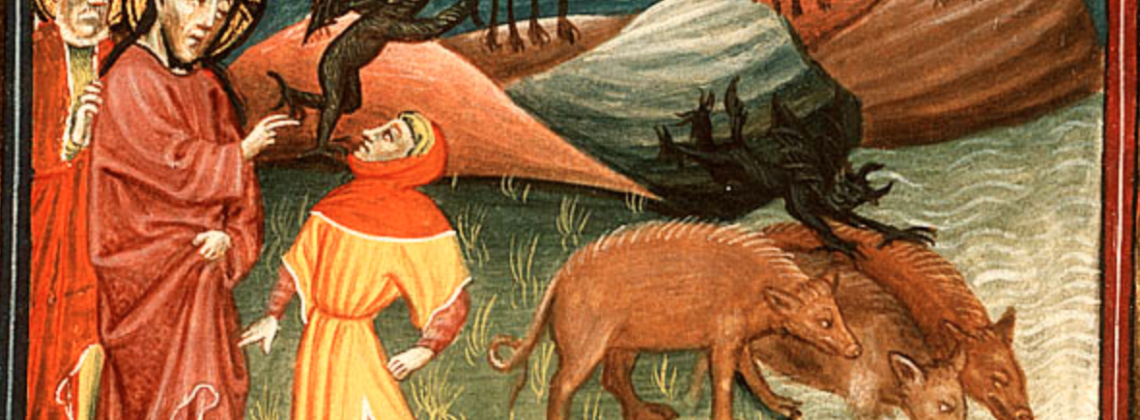

Are American evangelicals willing to accept converts who remain on the left?
The Gospel of Mark tells the story of a man living in a graveyard. Jesus finds the man “among the tombs; and no one could restrain him.” They had tried. “He had often been restrained with shackles and chains, but the chains he wrenched apart, and the shackles he broke.” Mark describes the man howling, bruising and cutting himself with stones, afflicted with “an unclean spirit.” On seeing Christ, the man falls upon his knees, and Jesus sends the spirits out of him and into a waiting herd of pigs, who drown in the sea.
It is the famous story of the Gadarene swine—complete with the spirit’s confession that “My name is Legion; for we are many.” The line inspired more than a few witch hunts in Europe, dozens of bad Hollywood films, and an untold number of unproduced Netflix originals.
But the name of the demon and the death of the pigs are not nearly as interesting as what comes next. The people from the neighborhood arrive and see Jesus, as well as “the demoniac sitting there, clothed and in his right mind”—and they beg Jesus to leave, for “they were afraid.”
I never understood this verse until Rev. Otis Moss III explained it to me: Only when the madman is clothed and in his right mind do the people fear what Jesus can do. The chains, the madness, the poverty, the self-harm: This is a story about marginalization, mental health, mass incarceration, and more. These are, Moss says, “existential questions, and theological questions, and biblical questions.” The people seem perfectly content with a chained man screaming in a graveyard—but when clothed and in his right mind, they are terrified. In other words: They fear a restoration of justice to the oppressed, the homeless, and the marginalized, and they understand that Jesus as God has the power to bring about restoration.
Mark 5 is one of my favorite “lefty” parts of the bible, of which there are many (Luke 14:13, Matthew 6:1, Ephesians 4:31-32). Indeed, despite the association of the American left with secularism, there is a lot leftists admire about the life of Christ. And admiration is just a step from love. So there may have never been a better time for churches to send apostles to the liberals.
It will be a hard sell.
White evangelicalism, the most visible branch of American Christianity, is overwhelmingly right-wing and predominantly pro-Trump. Despite Trump’s ignorance of Christian prayer and his appalling inability to live up to any biblical moral standard, evangelicals have touted him as a Christian defender, a “baby Christian,” and even as the Second Coming. Recent polls reveal that over half of Republicans subscribe to the belief that the United States ought to be a Christian nation, where Christians receive preferential treatment and control of all institutions, and the government pursues biblical objectives (however defined).
Not much there to entice those seeking racial justice, climate action, or religious liberty.
From a missional perspective, this looks like fertile ground. There are plenty of unchurched folks in the U.S., many of whom share gospel concerns. Yet the response from evangelicals has generally been disdain. Choosing to see Christianity as an us-versus-them proposition, they have largely built theological and political fortresses from which to dominate American public life. If it is not pure Christian nationalism, it smacks of it: The Christian’s goal is to claim the country for Christ rather than preach the gospel. Like the witch hunters and the Hollywood producers, they are more interested in the names of demons than the restoration—or the life—of the man among the tombs.
Even recent efforts to moderate the tone of evangelical Christianity have suffered from conservative political alliances. The extensive “He Gets Us” advertising campaign—whose Super Bowl ad showed dozens of pictures of racial justice and anti-vaccine protests from 2020 onward—has sought to emphasize Christ’s humanity, with taglines like “Jesus didn’t want us to act like adults,” and “Jesus forgave his enemies.”
The trouble is, these ads are funded by a variety of dark-money donors—including David Green, founder of Hobby Lobby. Green has been pouring money into right-wing politics for decades, and it was his company’s legal suit that allowed companies to deny their employees coverage for contraception based on the company’s religious concerns.
In other words, the very person now running a market-vetted ad campaign intended to rehabilitate Jesus’ image is also a person who has fueled the culture wars. Indeed, he has already proven in court that, as an employer, his religious opinions count more than his employees’.
It’s as though Green needed first to remake the nation to his own liking and then decided to remind us of Jesus’ compassion and forgiveness. “He Gets Us” may be a savvy rebranding of the Christian message, but it stinks of the Pharisees—a reminder of God’s love from the very people who wield swords to punish the unrighteous. Green seems fine with the world as it is and the desperate where they are, at least now that his people are on top. It is the essence of the oft-stated Twitter claim that modern evangelicals do not follow Jesus.
I believe, however, that evangelicals do follow Christ, and seek to spread the love of God. The challenge for evangelicals, if they wish to reach the unchurched, is to lose the marketing campaign and embrace the social dimension of Christ’s ministry—to focus less on the name of Legion and more on the power of Christ to restore health and humanity to the man among the tombs.
There are many on the American left whose implicit faith that “the arc of history bends towards justice” has been sorely tested—or abandoned—in the past decade. They may be very receptive to a gospel message about a suffering servant, living in a Roman world that did not understand him, did not understand justice, did not understand God. And there are already many on the American left with a deep respect for the life of Jesus—he who went among the tombs to care for and restore a madman bound in chains.
In Christian parlance, there are souls waiting to be won for God. The question is whether American evangelicals (with or without Green) can accept liberals as converts if they do not accept conservative politics first. It will require an evangelical willing to step back from the hard line of American politics—to accept that the gospel of Christ exists for broken people and those who need justice, and not for the sacralization of the American flag or the banning of contraception. They would need to be willing to preach the gospel to people who might not ever “see the light” on abortion or immigration but who might nonetheless come to accept the godhood of Christ.
The gospel does not need to be rebranded or overly marketed for liberals to understand it as a powerful story and metaphor. The Bible does that on its own. If American evangelicals want to lead liberals towards the redemptive power of Christ as both metaphor and reality, they may need to transcend politics: to recognize that Christ never spoke about America in the gospels, but that he did speak about brokenness, and he did restore the lowest to the highest, “clothed and in his right mind.” Who then will be afraid?
Adam Jortner is the Goodwin-Philpott Professor of Religion in the History Department at Auburn University. He is the author of the Audible series Faith of the Founding Fathers and was part of the creative team behind Where in Time is Carmen Sandiego?
Interesting article. This Sunday, I’m preparing a sermon on Act 15–the Jerusalem Council where the Apostles are trying to discern whether Gentile converts need to become Jews before they can become Christians. It seems a similar question for evangelicals, do people need to become (modern American) conservatives before they become Christians. I think not. Thanks for this thought-provoking read (and sermon material!)
Thanks, Kory. Adam is framing this issue in a way that few people are framing it. This is a very important piece.
Let me get this straight: if it weren’t for those terrible white evangelicals, leftists would be accepting Christ in droves. This reminds me of your Auburn colleague, Roderick Long, who once claimed with a straight face that if it were not for the Proud Boys, the Antifa folks in Portland would be organizing and running soup kitchens for the poor.
Every group has its issues. Perhaps we should remember that the leftist version of Christianity, as best articulated in Sojourners (and I am sure that you and John Fea are big supporters) is that Jesus came to affirm whatever lifestyle you choose, including adultery and polyamory. (The woman who wrote the polyamory article for Sojourners also assured readers that she had a “deeply-held faith.”)
So, it seems to me that leftists like you and Fea already have a wonderful Christian faith to choose that doesn’t involve any of that white evangelical stuff that all of you hate, anyway. Intead, you have the morally-superior faith that allows you to have all the free sex you want — as long as everyone involved consents.